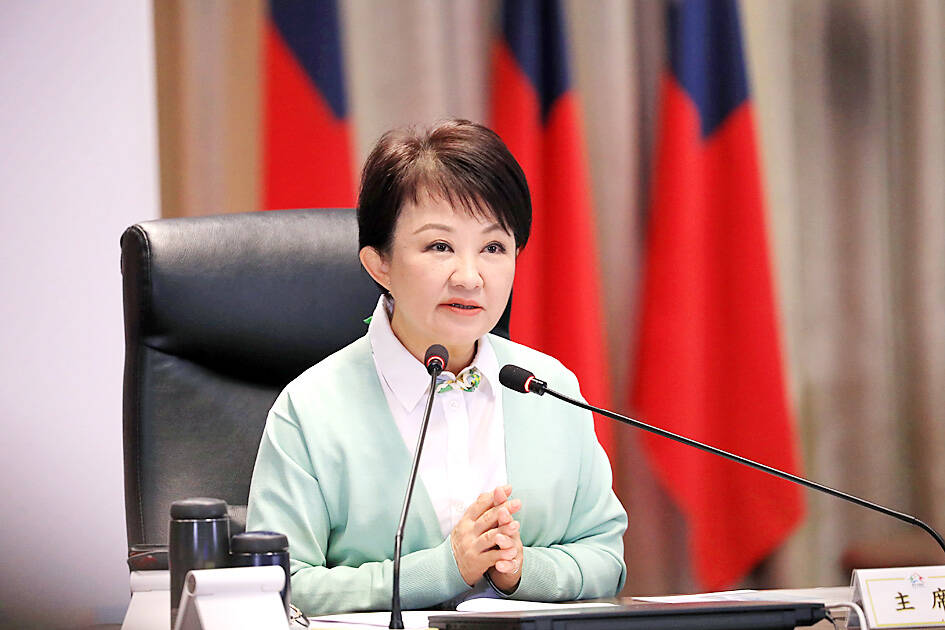Taiwan Semiconductor Manufacturing Co (TSMC, 台積電) is expected to inaugurate a new 1.4-nanometer fab in Taichung, the most advanced operated by the world’s biggest contract chipmaker, in 2027, after the government approved zoning changes for the project, the Taichung City Government said yesterday.
The new fab is expected to generate NT$1.2 trillion (US$38 billion) in production value, together with companies that would also operate in the newly planned industrial area, the city government said, citing a Central Taiwan Science Park (中部科學園區) estimate.
“TSMC hopes to add capacity for its second-phase expansions in Taichung to cope with customer demand. The chipmaker operates three fabs in the city now,” Taichung Mayor Lu Shiow-yen (盧秀燕) said yesterday.

Photo: Su Meng-chuan, Taipei Times
TSMC plans to build four 12-inch fabs, utilizing more advanced technology than its 2-nanometer technology, the city government said.
The project is expected to create 4,200 jobs.
Lu’s remarks came after the Ministry of the Interior approved the zoning changes proposed by the Taichung City Government for the land that has been allocated for the new TSMC fab.
As a major portion of the land is privately held by a single owner, who operates a golf course there, the land appropriation should be easier, the city government said.
The Central Taiwan Science Park administration would be in charge of land appropriation.
TSMC’s 2-nanometer chips are scheduled to be available next year. The chipmaker’s 3-nanometer chips are already being used in Apple Inc’s latest iPhone 15 series.
TSMC is expanding its global footprint to satisfy customer demand and boost supply chain resilience, while further developing advanced wafer manufacturing and packaging technologies in Taiwan.
The company plans to budget between US$28 billion and US$32 billion for capital expenditures this year, with about 70 to 80 percent of it earmarked for advanced technology capacity expansion, it said.

Taiwanese suppliers to Taiwan Semiconductor Manufacturing Co. (TSMC, 台積電) are expected to follow the contract chipmaker’s step to invest in the US, but their relocation may be seven to eight years away, Minister of Economic Affairs J.W. Kuo (郭智輝) said yesterday. When asked by opposition Chinese Nationalist Party (KMT) Legislator Niu Hsu-ting (牛煦庭) in the legislature about growing concerns that TSMC’s huge investments in the US will prompt its suppliers to follow suit, Kuo said based on the chipmaker’s current limited production volume, it is unlikely to lead its supply chain to go there for now. “Unless TSMC completes its planned six

Intel Corp has named Tasha Chuang (莊蓓瑜) to lead Intel Taiwan in a bid to reinforce relations between the company and its Taiwanese partners. The appointment of Chuang as general manager for Intel Taiwan takes effect on Thursday, the firm said in a statement yesterday. Chuang is to lead her team in Taiwan to pursue product development and sales growth in an effort to reinforce the company’s ties with its partners and clients, Intel said. Chuang was previously in charge of managing Intel’s ties with leading Taiwanese PC brand Asustek Computer Inc (華碩), which included helping Asustek strengthen its global businesses, the company

Power supply and electronic components maker Delta Electronics Inc (台達電) yesterday said second-quarter revenue is expected to surpass the first quarter, which rose 30 percent year-on-year to NT$118.92 billion (US$3.71 billion). Revenue this quarter is likely to grow, as US clients have front-loaded orders ahead of US President Donald Trump’s planned tariffs on Taiwanese goods, Delta chairman Ping Cheng (鄭平) said at an earnings conference in Taipei, referring to the 90-day pause in tariff implementation Trump announced on April 9. While situations in the third and fourth quarters remain unclear, “We will not halt our long-term deployments and do not plan to

TikTok abounds with viral videos accusing prestigious brands of secretly manufacturing luxury goods in China so they can be sold at cut prices. However, while these “revelations” are spurious, behind them lurks a well-oiled machine for selling counterfeit goods that is making the most of the confusion surrounding trade tariffs. Chinese content creators who portray themselves as workers or subcontractors in the luxury goods business claim that Beijing has lifted confidentiality clauses on local subcontractors as a way to respond to the huge hike in customs duties imposed on China by US President Donald Trump. They say this Chinese decision, of which Agence